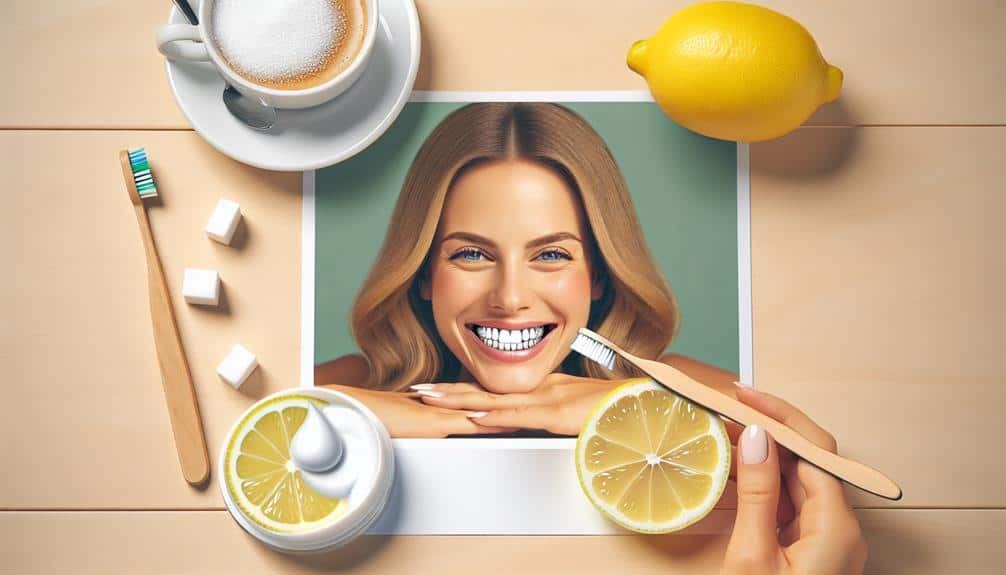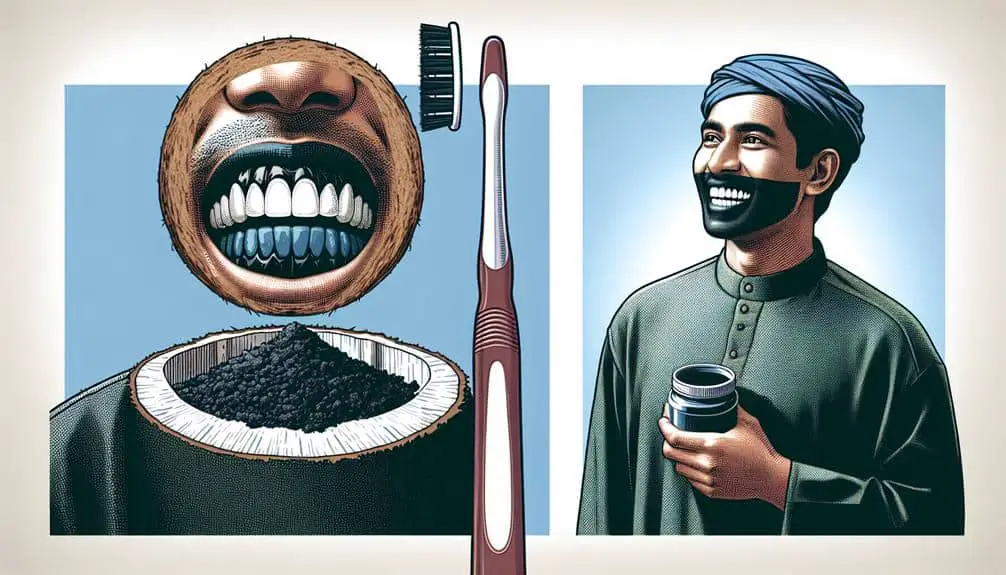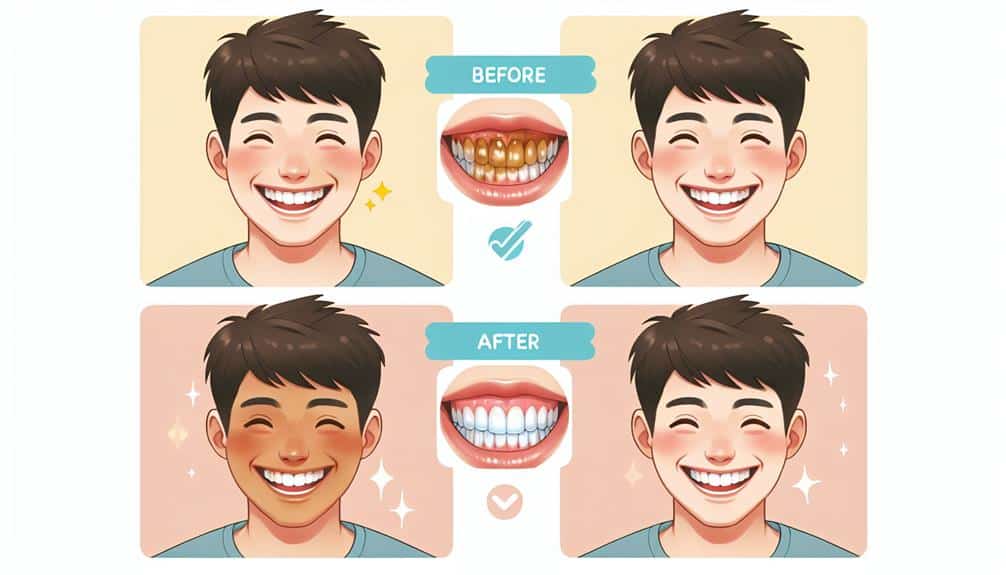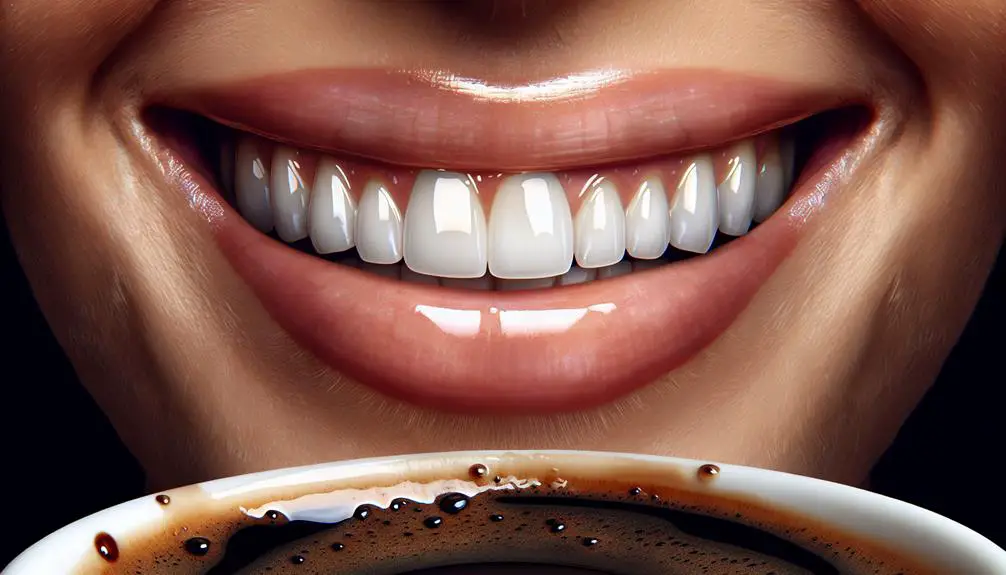Brighten your coffee-stained teeth quickly by trying whitening toothpaste with key ingredients like hydrogen peroxide or carbamide peroxide. Incorporate proper brushing techniques using a pea-sized amount of toothpaste and gentle circular motions for two minutes. Consider professional whitening treatments such as in-office bleaching or laser whitening for stubborn stains. At-home whitening kits containing hydrogen peroxide can be a convenient and cost-effective solution, and natural remedies like lemon juice and baking soda can help too. Whitening strips and gels with peroxide-based agents also offer quick results. Combine these solutions for a brighter smile.
Key Points
- Use whitening toothpaste with hydrogen peroxide or carbamide peroxide for coffee stains.
- Consider professional whitening treatments like in-office bleaching or laser whitening.
- Try at-home whitening kits with bleaching agents for convenient and cost-effective solutions.
- Explore natural remedies like lemon juice or baking soda to help lighten stains.
- Use whitening strips or gels consistently following instructions for noticeable results in a few days.
Whitening Toothpaste Options
To effectively brighten coffee-stained teeth fast, consider incorporating whitening toothpaste into your daily oral care routine. When selecting a whitening toothpaste, it's important to pay attention to brushing techniques and sensitivity concerns. Proper brushing techniques include using a pea-sized amount of toothpaste and brushing gently in circular motions for two minutes. Individuals with sensitivity concerns should opt for toothpaste formulas that are specifically designed for sensitive teeth to prevent discomfort while whitening.
When evaluating the effectiveness of whitening toothpaste, look for key ingredients such as hydrogen peroxide or carbamide peroxide, which are known for their whitening properties. These ingredients work by breaking down stains on the tooth surface, resulting in a brighter smile over time. Brand comparisons can also help in choosing the right whitening toothpaste for your needs. Some popular brands known for their whitening toothpaste include Crest, Colgate, and Sensodyne.
Professional Whitening Treatments
Considering professional whitening treatments for coffee-stained teeth? When it comes to effectively addressing stubborn stains, dental procedures offered through cosmetic dentistry can provide significant results. Professional whitening treatments, such as in-office bleaching or laser whitening, are popular choices for those seeking a quick and noticeable improvement in the color of their teeth. These procedures are often performed by trained dental professionals who can customize the treatment to suit your specific needs and guarantee safety.
In-office bleaching involves applying a bleaching agent to the teeth and activating it with a special light, resulting in a rapid whitening effect. On the other hand, laser whitening utilizes laser technology to enhance the whitening process, delivering impressive outcomes in a shorter time frame. Both methods offer effective solutions for coffee-stained teeth, with many patients experiencing immediate results after just one session.
If you're looking to achieve a brighter smile efficiently, exploring professional whitening treatments in the field of cosmetic dentistry could be the ideal solution for you.
At-Home Whitening Kits
Looking to whiten your coffee-stained teeth at home? At-home whitening kits can be an important solution. These kits often contain bleaching agents like hydrogen peroxide to help remove surface stains on your teeth. DIY methods using at-home whitening kits are convenient and offer quick fixes for stained teeth.
When using at-home whitening kits, it's vital to follow the instructions carefully to avoid any potential side effects such as tooth sensitivity or gum irritation. Most kits come with custom-fitted trays or strips that mold to your teeth, ensuring even application of the whitening agent. Quick fixes can be achieved by consistently using these kits as directed.
While at-home whitening kits can provide noticeable results, it's important to manage expectations. Stubborn stains may require professional intervention. However, for mild to moderate discoloration caused by coffee, tea, or other staining agents, at-home whitening kits offer a convenient and cost-effective solution.
Natural Remedies for Stains
For those seeking natural remedies to combat teeth stains, exploring alternative approaches may offer effective solutions. One popular natural remedy is the lemon juice remedy. Lemon juice contains citric acid, which has mild bleaching properties that can help lighten stains on the teeth. To use this remedy, mix a small amount of lemon juice with water and swish it around in your mouth for a minute or two. However, be cautious as the acidity in lemon juice can potentially erode tooth enamel if used excessively.
Another common natural remedy is the baking soda trick. Baking soda is mildly abrasive and can help scrub away surface stains on the teeth. You can create a paste by mixing baking soda with water and gently brushing it onto your teeth. Remember not to use this remedy too frequently as the abrasiveness of baking soda can wear down tooth enamel over time.
Natural remedies like the lemon juice remedy and baking soda trick can be effective in brightening coffee-stained teeth, but it's crucial to use them judiciously and consult with a dentist if you have any concerns.
Whitening Strips and Gels
Whitening strips and gels offer a convenient and effective solution for brightening teeth stained by coffee consumption. These products typically contain peroxide-based bleaching agents that penetrate the enamel to lift stains. When used as directed, whitening strips can noticeably lighten teeth within a few days to a couple of weeks. Gels, on the other hand, are applied directly to the teeth using a brush or tray, allowing for more targeted treatment.
For those seeking a quick fix, whitening strips and gels are a popular choice due to their ease of use and proven results. However, it's imperative to follow the instructions carefully to avoid potential side effects such as tooth sensitivity or gum irritation. Additionally, combining these products with DIY whitening hacks or whitening pen techniques can enhance their effectiveness and help maintain a brighter smile over time.
Frequently Asked Questions
Can Coffee-Stained Teeth Be Permanently Whitened or Is It a Continuous Process to Maintain Results?
Forever fighting coffee stains on teeth? Permanent whitening offers hope. Maintenance is key for lasting luster. Seek instant results but embrace the journey for long-term effects. Consistent care conquers coffee's curse.
Are There Any Specific Foods or Drinks That Should Be Avoided to Prevent Further Staining on Whitened Teeth?
To prevent further staining on whitened teeth, avoid stain-causing foods like coffee, tea, and red wine. Incorporate preventive measures by maintaining good oral hygiene habits, such as regular brushing, flossing, and using whitening toothpaste to preserve your bright smile.
How Long Does It Typically Take to See Noticeable Results When Using Natural Remedies for Coffee-Stained Teeth?
To see noticeable results when using natural remedies for coffee-stained teeth, it typically takes a bit of time. Speed of results varies, with natural options like baking soda showing gradual improvement over weeks, whereas commercial products may offer quicker outcomes.
Are There Any Potential Side Effects or Risks Associated With Using At-Home Whitening Kits?
When using at-home whitening kits, potential risks and side effects may include tooth sensitivity, gum irritation, and enamel damage if not used correctly. Follow safety precautions, such as using as directed to minimize risks.
Can Frequent Whitening Treatments Lead to Tooth Sensitivity or Damage Over Time?
Frequent whitening can strip your teeth's armor, causing sensitivity and potential damage. It's like over-exfoliating your skin; moderation is key for lasting effectiveness without risking harm. Prioritize oral health alongside your quest for whiter teeth.



